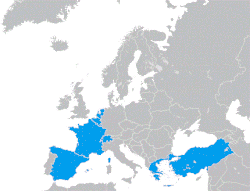International Commission on Civil Status
The International Commission on Civil Status, or ICCS (French: Commission internationale de l'état civil, or CIEC), is an intergovernmental organization and the first organization created after World War II in order to work for European integration. Provisionally established in Amsterdam, Netherlands, on September 29 and 30, 1948,[2] it predates both the Council of Europe (planned since 1946 but officially founded only in 1949) and the European Union. The organisation is seated in Strasbourg, France, and has 7 members and 10 former members.[3] The official language of the Commission is French.
 | |
| Abbreviation | ICCS |
|---|---|
| Formation | September 30, 1948 (provisional committee) December 1949 (official recognition)[1][2] |
| Type | Intergovernmental Organization |
| Purpose | international cooperation in civil status matters and further exchange of information between registrars |
| Headquarters | Secretariat General |
| Location |
|
Membership | 6 states |
Official language | French |
President | Massa[1] |
Secretary-general | Frédérique Granet[1] |
Main organ | General Assembly |
| Website | ciec1 |
Purpose
Founded in the post-war context of millions of refugees, missing persons and displaced people, the organization's aim was to facilitate the cooperation between States in establishing, recognizing, validating vital records or any other type of official documents used as birth, marriage, divorce or death certificates. It did so by providing standardized translations of vital terms in vital records and via multilateral conventions (for example the Convention on the issue of multilingual extracts from civil status records which provided for hassle free acceptance of extracts and Convention on the recognition of decisions recording a sex reassignment on legal sex status). The ICCS has signed co-operation agreements with the Council of Europe (in 1955), the Hague Conference on Private International Law (in 1969), the United Nations High Commissioner for Refugees (in 1981) and the European Union (in 1983).
States
States can become a member of the organisation by adhesion of to its constituting protocol ("Protocole relatif à la Commission internationale de l'état civil"), which was signed by the 5 founding members. An overview of the members and former members is shown below.
| State | Entry into force | End of membership | Comment |
|---|---|---|---|
| Austria | 14 October 1961 | 8 April 2008 | |
| Belgium | 1 October 1950 | Founding member | |
| Croatia | 24 April 1999 | 21 January 2015 | |
| France | 1 October 1950 | 17 November 2019 | Founding member |
| Germany | 27 October 1956 | 30 June 2015 | |
| Greece | 3 October 1959 | ||
| Hungary | 15 October 1999 | 6 December 2012 | |
| Italy | 4 October 1958 | 2 October 2014 | |
| Luxembourg | 1 October 1950 | Founding member | |
| Mexico | 15 October 2010 | 16 December 2017 | |
| Netherlands | 1 October 1950 | 15 May 2018 | Founding member |
| Poland | 15 October 1999 | 14 December 2017 | |
| Portugal | 13 September 1973 | 10 January 2015 | |
| Spain | 13 October 1974 | ||
| Switzerland | 1 October 1950 | Founding member | |
| Turkey | 23 December 1953 | ||
| United Kingdom | 11 October 1996 | 22 February 2014 |
See also
References
- "ICCS Chronicle" (PDF). International Commission on Civil Status. Archived from the original (PDF) on 1 April 2012. Retrieved 17 June 2012.
- "Information note" (PDF). International Commission on Civil Status. Archived from the original (PDF) on 1 April 2012. Retrieved 17 June 2012.
- "Protocole relatif à la Commission internationale de l'état civil" (PDF). Government of Switzerland. Retrieved 13 September 2017.
